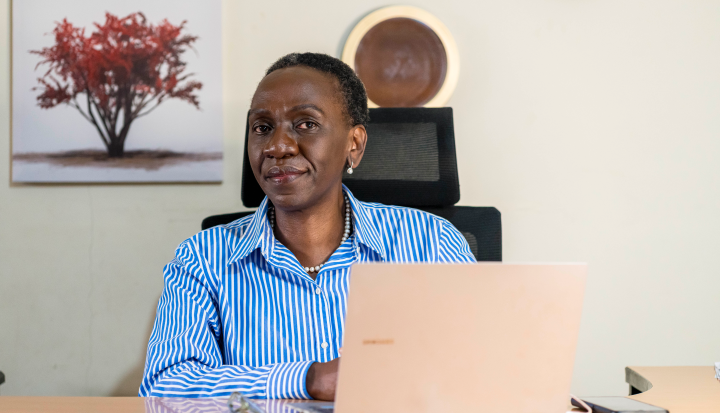Digital inclusion is crucial for economic justice, but women lack connectivity
The complex issue of women’s economic justice is often reduced to conversations on equal pay or boardroom representation.
As a woman leader, I of course see the value in these topics. However, the intersections of patriarchal structures, systemic inequalities, sexist attitudes, and access to digital tools are key drivers in the economic gender gap that remain largely under-discussed. In failing to explore and seek solutions to these challenges, we’re leaving half the population behind. This is a mistake we simply cannot afford to make!
Late last year, over 1,100 women entrepreneurs across 81 low and middle income countries shared their experiences with the Cherie Blair Foundation for Women. Their responses formed our latest research report, titled ‘Bridging the Divide: Women, Tech and Business Success’, and released this week for International Women’s Day.
Our study reveals a significant reliance by women on digital tools for their businesses, with 92.1% reporting high internet usage, predominantly on smartphones. And it reveals a host of potentially devastating barriers that stymie women’s access to digital tools and contribute to an uneven business playing field.
The growing importance of digital platforms, connectivity, and e-commerce as tools for business is clear: Nearly a quarter (24.4%) of women surveyed highlighted increased digital inclusion as a key factor in business success and almost a third (32.8%) attributed success to improved access to business networks—including virtual. What’s more, women entrepreneurs’ technology-related spending is increasing, with 37.2% growth projected in 2024.
Despite this, internet costs and network disruptions present significant barriers to internet access for women, with 69.1% and 67.3% reporting these issues respectively. This is increasingly disruptive as more financial transactions, marketing activity, and other business functions move online.
Ivonne Ocrospoma, who runs L&L Translation Services in Guyana and who used the Foundation’s business skills app HerVenture to learn about mobile money, said it best: “Advancements in technology are changing the world and the way we do business, so we have to keep up with them.”
Technology presents opportunities, but we must not ignore its risks
Emerging technologies such as mobile money and AI can be valuable tools for women entrepreneurs. In fact, 44.4% of women entrepreneurs surveyed said they have already adopted AI tools in their businesses, indicating a positive trend toward embracing advanced technologies for various business purposes.
However, 65.5% of survey respondents cited a lack of training as the primary barrier to AI adoption. This highlights the importance of educational initiatives to enhance women’s understanding of and proficiency in using AI tools to power their small businesses.
While digital tools can be used to benefit businesses, they can also put women entrepreneurs at risk. We know that the world is less safe for women, and digital spaces are no exception.
Women entrepreneurs face many forms of gender discrimination, including digital gender based violence (GBV). This includes online harassment, stalking, exploitation, and other harmful acts. Almost seven out of 10 (67.4%) women surveyed reported personally witnessing or experiencing online GBV over the past year and many provided their first-hand accounts with harmful online behaviours that target women. Disturbingly, nearly half (45.4%) of respondents reported that instances of online GBV had impacted the success of their businesses.
Digital GBV isn’t the only online discrimination women entrepreneurs face. Algorithms are often trained on biased datasets, which may lead to discriminatory outcomes. This can impact women’s ability to access capital, which is already the top challenge for women business owners, as reported by over a quarter (25.6%) of women.
Bridging both the digital gender gap and the economic gender gap means calling out and combatting online violence against women and ensuring that women are able to access online spaces related to their businesses safely and without fear of harassment or discrimination.
Whilst ending GBV does not require legitimisation via a business case, with GBV affecting our economies to the tune of US$1.5 trillion annually, according to UN Women, the scale of the opportunity is clear across multiple domains.
We urge the private sector to take action to help bridge the divide
The private sector has a key role to play in supporting women entrepreneurs to thrive in an ever-changing business environment. Businesses can and must take action now to help close the gender gap in entrepreneurship, and address the issues that perpetuate it. One needs only to look at the reach and impact of our own collaborations with partners such as DHL Express and PayPal, supporting many thousands of women’s digital literacy, networks and access to finance, to see that it can be done.
This International Women’s Day, we’re calling on private sector organisations to invest in women’s entrepreneurship and help create a more level playing field for women business owners. In addition to directly investing in and providing funds to women-owned businesses in low and middle income countries, companies should strive to work in partnership with government agencies, nonprofit organisations and multilateral organisations to provide vital training and support programmes and services to women entrepreneurs.
We encourage the private sector to work to develop a more nuanced understanding of local markets in low and middle income countries, in terms of women entrepreneurs’ needs and spending patterns. We also urge the sector to forge partnerships—potentially supported by government agencies and NGOs—between local women entrepreneurs’ networks in low and middle income countries and values-driven investors around the world.
Download the research report for more information on how your company can get involved.










